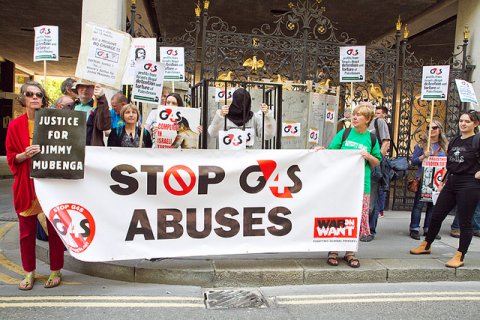
4 June 2014
Stephen Struthers says G4S cannot be trusted to run our public services.
Tomorrow G4S is holding its AGM at the Excel Centre in London, and we'll be outside with the protest organised by Stop G4S. Our recent polling shows that G4S is not trusted by the public, and the top five words people associate with it are unreliable, incompetent, untrustworthy, self-interested and greedy. We're campaigning for a Public Service Users Bill to start to give people more powers to hold companies like this to account.
The reputation of G4S for failure and evasion is well deserved. The biggest and most high profile example was of course, the failure to provide 10,400 security guards as contracted, for the Olympic Games, which required military personnel to be drafted in at the last minute. One of the most horrific examples was the case of Jimmy Mubenga, who died while being deported by G4S in 2010 - three security guards are now being charged with manslaughter.
But the company has not exactly covered itself in glory in providing other public services. For example, the prison inspectorate found that ‘it was easier to get drugs than soap’ at G4S Oakwood prison, from where there have been numerous reports that it is unsafe, and that nothing works. Indeed, it was described in an official report in 2013 as one of the three worst prisons in the country.
Characteristically, the company tries to downplay its problems, and has been reluctant to 'fess up. In January this year following further disruption at Oakwood Prison, G4S initially said this lasted for five hours, then revised this figure to nine, before conceding that it actually took ten days to return the wing concerned to normal operation, after what some prison officers had told Radio 4 was “a full-scale riot”. Rooftop protests at the same prison were, incredibly, explained to Parliament by G4S’s principal apologists, a.k.a. government ministers, as ‘working at height’!
But this is just the tip of the iceberg. For eight years G4S falsely invoiced the government for electronically tagging dead, missing, or released prisoners. In response to this fiasco, G4S was temporarily banned from bidding for further government contracts; although quite why officials had to be told not to hire an incompetent and dishonest company to provide public services remains a mystery. The company was not deterred, however. For after initially offering £24 million to pay back government G4S checked its arithmetic and came up with a second figure of more than £130m. This innovative response to being found out clearly worked, for within days, the company was back in favour with the Ministry of Justice (normally so keen to punish anti-social and criminal activity). It was allowed to bid for government contracts again, as if the continuing criminal investigation by the Serious Fraud Office was a mere trifle. We should not be surprised at this outcome, given both the commitment of the government to privatised public services regardless of performance, and the interdependence of government and outsourcing companies.
Such a level of payment is, of course, small beer for a company the size of G4S, the world's largest security company operating in 125 countries, and reportedly the third-largest private sector employer in the world. The company had been formed in July 2004 from a merger of two long- standing UK companies specialising in security, Group 4 Falck and Securicor. By 2012, £1.9 billion revenue was being generated annually in the the UK, with over a third of this (£700 million) from central government for public services. About half of this is for the Ministry of Justice.
This mutual dependence may explain why a blind eye is being turned to serial incompetence and worse. G4S employees running Brook House immigration removal centre in Gatwick, were involved in forging a document and contempt of court after giving witness statements during an immigration appeal involving allegations of torture at the hands of a foreign government.
The Howard League recently put together a dossier of the failures of privatisation in the criminal justice system. G4S’s contribution to this included the case of a prisoner with terminal cancer at Birmingham Prison who was kept waiting for 40 minutes in handcuffs in full view of the public, by G4S prison staff who stopped at a sandwich shop for their lunch, while taking him to hospital. Nationally, children in G4S-run secure 'training centres' were restrained 4,608 times over a three-year period. One in five of these restraints resulted in children suffering injuries
After an initial emphasis on security related work, in which the company might reasonably claim some experience and expertise, the company is trying to extend its malign reach into other public services. Quite astonishingly, this includes child protection, caring for perhaps the most vulnerable people in society, where the government is keen to involve private companies. While G4S is trying to position itself for this, its dishonesty and lack of transparency is clearly habit forming, as it has tried to hide its identity in seeking planning permission for conversion of properties for children's homes. Hardly a good example for young people to follow!
Given such a catalogue of disaster, incompetence and dishonesty, it is disappointing that the government shows such little respect for the public who pay for public services through taxes and use them, and have a right to expect them to be carried out competently and honestly. G4S has repeatedly shown that it cannot be trusted to do this.
Join the protest:
Meet at 1pm on Thursday 5th June
ExCeL London, Royal Victoria Dock, London, E16 1XL

Photo used under Creative Commons licensing, thanks to the Palestine Solidarity Campaign.
